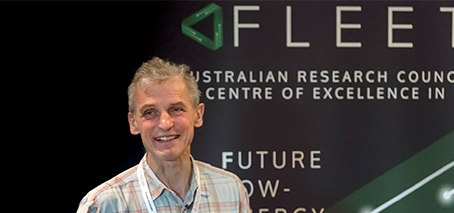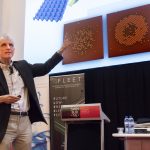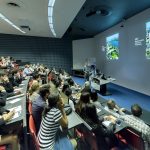Physics experiments at temperatures a billionth of outer space, and the benefits of flexibility in a science career.
Nobel physics laureate Prof Wolfgang Ketterle told a crowd of around 200 at Swinburne University of Technology last week about Bose-Einstein condensates (BECs), and other strange states of matter that exist at nano-Kelvin temperatures, which open a new door to the quantum world where particles behave as waves and ‘march in lockstep’. He expressed excitement at the discoveries that could remain to be made “if we can reach the pico-Kelvin scale”. ‘The talk was co-presented by Swinburne University, FLEET and the Victorian branch of the Australian Institute of Physics. Watch the talk here.
The next day, Prof Ketterle met almost ninety students and teachers at Monash University, describing his research and insights from his science career. For any students (or researchers!) nervous about their career path, he offered reassurance that changing research fields midstream only increased his confidence and creativity. Describing his move into cold atoms research, Ketterle said “although the field was new and I didn’t know anything about it, I knew how to learn new information.” In retrospect, considering that research won him a Nobel Prize in 2001, it worked out okay – and not only in “making better refrigerators,” at which he modestly claimed some ability.
The talk was followed by a casual ‘Lunch with a Laureate‘, with teachers and students sharing personal, round-table chats with Ketterle and other scientists, including Monash and FLEET researchers and Monash University’s Dean of Science Prof Jordon Nash.
Ketterle was in Melbourne for the inaugural annual FLEET workshop in Torquay, at which he gave one of the workshop’s most popular talks, describing the BECs that form an integral part of research in FLEET’s research theme two (in Elena Ostrovskaya‘s labs at ANU) and three (Kris Helmerson‘s Monash labs and Chris Vale‘s Swinburne labs). Watch the talk here. Prof Ketterle advises FLEET as a member of the Centre’s International Science Advisory Committee.
Ketterle also spoke with Red Symons on ABC Melbourne.
Professor Wolfgang Ketterle is a pioneer in the field of Bose-Einstein condensation in dilute atomic gases. His achievement of a Bose-Einstein condensate and fundamental studies of their properties won him a share in the Nobel Prize in Physics in 2001 (together with Eric Cornell and Carl Wieman). Other highlights of his scientific achievements include the first demonstration of an atom laser, the realisation of molecular condensates and the study of superfluidity in atomic systems.
Ketterle obtained his PhD from the University of Munich in 1986. He undertook postdoctoral work at MPQ and the University of Heidelberg and subsequently joined Massachusetts Institute of Technology in 1990. He is currently the John D. MacArthur professor of physics, the director of the Center of Ultracold Atoms, funded by the NSF, and Associate Director of MIT’s Research Laboratory of Electronics.





